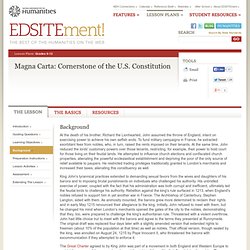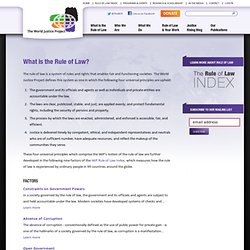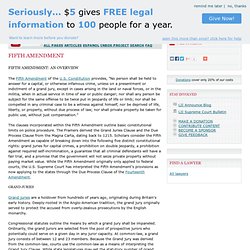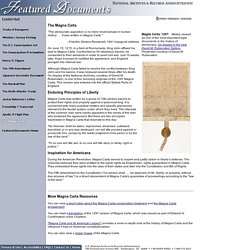

Magna Carta: Cornerstone of the U.S. Constitution. At the death of his brother, Richard the Lionhearted, John assumed the throne of England, intent on exercising power to achieve his own selfish ends.

To fund military campaigns in France, he extracted exorbitant fees from nobles, who, in turn, raised the rents imposed on their tenants. At the same time, John reduced the lords' customary powers over those tenants, restricting, for example, their power to hold court for those living on their feudal lands. He attempted to influence church elections and confiscated church properties, alienating the powerful ecclesiastical establishment and depriving the poor of the only source of relief available to paupers.
He restricted trading privileges traditionally granted to London's merchants and increased their taxes, alienating this constituency as well. King John's tyrannical practices extended to demanding sexual favors from the wives and daughters of his barons and to imposing brutal punishments on individuals who challenged his authority. The World Justice Project. The rule of law is a system of rules and rights that enables fair and functioning societies.

The World Justice Project defines this system as one in which the following four universal principles are upheld: The government and its officials and agents as well as individuals and private entities are accountable under the law. The laws are clear, publicized, stable, and just; are applied evenly; and protect fundamental rights, including the security of persons and property. The process by which the laws are enacted, administered, and enforced is accessible, fair, and efficient.
Justice is delivered timely by competent, ethical, and independent representatives and neutrals who are of sufficient number, have adequate resources, and reflect the makeup of the communities they serve. Factors Constraints on Government Powers In a society governed by the rule of law, the government and its officials and agents are subject to and held accountable under the law. Absence of Corruption Open Government. Fifth Amendment. The Fifth Amendment of the U.S.

Constitution provides, "No person shall be held to answer for a capital, or otherwise infamous crime, unless on a presentment or indictment of a grand jury, except in cases arising in the land or naval forces, or in the militia, when in actual service in time of war or public danger; nor shall any person be subject for the same offense to be twice put in jeopardy of life or limb; nor shall be compelled in any criminal case to be a witness against himself, nor be deprived of life, liberty, or property, without due process of law; nor shall private property be taken for public use, without just compensation.
" The clauses incorporated within the Fifth Amendment outline basic constitutional limits on police procedure. The Framers derived the Grand Juries Clause and the Due Process Clause from the Magna Carta, dating back to 1215. Grand Juries Grand juries are a holdover from hundreds of years ago, originating during Britain's early history. Double Jeopardy. Featured Document: The Magna Carta. The Magna Carta "The democratic aspiration is no mere recent phase in human history . . .

It was written in Magna Carta. " --Franklin Delano Roosevelt, 1941 Inaugural address On June 15, 1215, in a field at Runnymede, King John affixed his seal to Magna Carta. Confronted by 40 rebellious barons, he consented to their demands in order to avert civil war. Although Magna Carta failed to resolve the conflict between King John and his barons, it was reissued several times after his death. Enduring Principles of Liberty Magna Carta was written by a group of 13th-century barons to protect their rights and property against a tyrannical king. "No freeman shall be taken, imprisoned, disseised, outlawed, banished, or in any way destroyed, nor will We proceed against or prosecute him, except by the lawful judgment of his peers or by the law of the land.
" "To no one will We sell, to no one will We deny or delay, right or justice. " Inspiration for Americans More Magna Carta Resources.